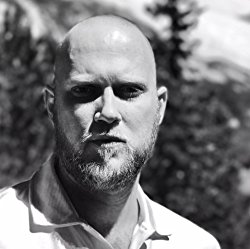Earlier this year, I sent off my novel Vendetta Protocol for a blurb from Baen books author Charles E. Gannon. When he responded with an excellent blurb, I was surprised by the last line of his email. After reading my book, he recommended me to authors Chris Kennedy and Mark Wandrey. I’d never heard of either of them, but in the weeks that followed, I learned that each of them had authored one book in what they called the Four Horsemen Universe – a military science fiction universe where humans most commonly act as mercenaries and often find themselves on the short end of the galactic stick. Mark and Chris offered me a story spot in an anthology they were launching to flesh out their universe based on that recommendation alone.
I hadn’t read their books and Chris and Mark hadn’t read mine. As we emailed back and forth, a knot of self-induced pressure built in my chest. Could I pull this off? Could I make good on my friend’s recommendation? When I received their “primer,” a fifteen page document outlining the basic rules of the universe, I sat down to read it and immediately gravitated to the concept of a Peacemaker Guild. Combined with a timely thought about a really bad movie from the 1980s, I developed a short story idea. Over the course of two weeks, I wrote the story and then did something I’ve never done before – I sent them the rough draft of the story and asked if I was anywhere close to what they wanted with their universe. Their response surprised me.
Not only was the story exactly what they wanted, they wanted me to continue the story of Earth’s first Peacemaker in novel format. I looked at my writing plan for the year, the success of the two additional books they launched in the universe, and what they were doing with the anthology (of which there were plans for three) and said yes. I scrapped finishing my Protocol War series in 2017 and signed on to write an unplanned book in a universe I was still learning about, and I had about twelve weeks to do it. Could I?
I did. When I completed the novel Peacemaker and turned it in to them, I had no idea what to expect. Would they like the story? Would the rabid fans of the Four Horsemen Universe embrace it? Had I told the kind of story I wanted to tell in their universe? The answer to all of those questions unfolded in late August and was a resounding “YES!” From that unexpected invitation, I’ve now committed to writing a total of three books in the Peacemaker storyline and have just completed book two – Honor The Threat.
For me, 2017 was all about embracing unexpected opportunities. Doing so has led me into avenues I’d never considered and put my work in front of new readers and fans. It’s hard to believe that I’m writing a new series from a short story idea, but that’s the way this writing thing tends to work. I’ve paddled into a wave and I’m going to ride it as best I can. In the coming year, I have books to write and conventions to attend, but I’ll be looking for opportunities because they can come in the most unexpected places. Keep your eyes and ears open – you never know where things might go.

